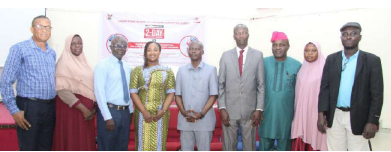2
… As Experts Push Standardied Testing, IPC Compliance Across All Facilities
… Warn, Bacterial Contamination Remains Top Global Cause Of Transfusion-Related Deaths
Lagos State has sharpened its blood safety system as 2,500 public and private blood bank personnel participated in a two-day hands-on training on standardized testing, transfusion accuracy, and infection prevention, held on November 20 and 21 at the MRC Laboratory, LASUTH, Ikeja. The capacity-building programme, organised by the Lagos State Blood Transfusion Service (LSBTS), focused on strengthening safety practices across the entire blood transfusion value chain.
Declaring the training open, Executive Secretary of the LSBTS, Dr. Bodunrin Osikomaiya, said the initiative represents a strategic intervention targeted at closing quality gaps and reinforcing practices that align with both national and international safety standards. She noted that the theme, “Advancing Blood Safety and Quality through Standardized Testing and Infection Control Practices,” underscores Lagos State’s commitment to improving donor screening, blood collection, laboratory procedures, and transfusion outcomes.
Dr. Osikomaiya warned that bacterial contamination remains one of the leading causes of transfusion-related illness and death worldwide, stressing that many blood banks underestimate the threat because attention is often skewed toward viral infections such as HIV, Hepatitis B, and Hepatitis C. She said strict disinfection, avoidance of open-system manipulation, and adherence to sterile procedures are indispensable for preventing contamination.
She explained that competencies gained during the programme would directly influence the forthcoming 2026 External Quality Assurance (EQA) Assessment, where facilities will be evaluated on accuracy of tube grouping, crossmatching proficiency, documentation quality, and infection prevention compliance. She added that regular monitoring visits by the LSBTS would assess the extent to which facilities implement the protocols taught during the training.
Reinforcing government commitment, Dr. Osikomaiya said the Lagos State Ministry of Health, through the Lagos State Blood Transfusion Committee (LSBTC), will continue to improve quality systems across facilities, harmonise testing procedures, strengthen documentation culture, and support public-private collaboration to ensure a fully standardised state blood system.
A senior lecturer and consultant medical microbiologist at LASUCOM/LASUTH, Dr. Bamidele Mutiu, delivered a detailed technical session highlighting the science, mechanisms, and risks associated with transfusion-transmitted bacterial infections (TTBIs). He said over 72 infectious agents are known to be transmitted through blood, with bacteria accounting for the majority of rapid, life-threatening transfusion reactions.
Dr. Mutiu who is the Director of the Lagos State Biobank explained that contamination may occur during skin preparation, blood collection, processing, or due to donor bacteremia, and stressed that platelets carry the highest risk because they are stored at room temperature. He emphasised that symptoms such as fever, chills, hypotension, and septic shock must never be overlooked, as TTBIs may mimic other clinical conditions.
He also underscored the importance of stringent donor screening, aseptic collection techniques, and improved vigilance among clinicians, noting that a completely risk-free blood supply is unrealistic but risks can be drastically reduced through technology, quality systems, and competent personnel. He urged participants to “learn, unlearn, and relearn,” saying continuous capacity building is essential to sustaining safe transfusion services.
Speaking further in an interview, Dr. Mutiu said the training aligns with efforts to enhance the quality of blood provided to residents by ensuring all organisms capable of causing disease are screened out and that every collected unit meets acceptable safety thresholds.
Head of Monitoring and Enforcement at LSBTS, Dr. Samuel Alori, presented an overview of regulatory frameworks guiding blood transfusion in Lagos State. He said the LSBTC conducts routine monitoring of private and public blood banks to ensure full compliance with WHO, NBSC, and Lagos State standards, including licensing requirements, proper component preparation, mandatory testing, and haemovigilance.
Dr. Alori noted that Lagos has witnessed a reduction in illegal blood banking practices due to strengthened inspections and the introduction of improved monitoring tools, including updated checklists, transfusion consent forms, and HaemoCentral, the state’s digitised haemovigilance platform.
Also speaking, Head of Blood Bank and Component Production, LSBTS, Mrs. Rasheedat Mecca, took participants through a step-bystep Standard Operating Procedure (SOP) on safe blood collection, donor identification, venipuncture preparation, aseptic collection techniques, and proper post-donation care. She stressed that incorrect handling, poor site cleaning, or deviation from SOPs can compromise blood quality and endanger recipients.
Mrs. Mecca highlighted the importance of maintaining proper storage temperatures, correct documentation, and timely component separation, noting that donated blood must remain in quarantine until infectious disease screening results are confirmed.
One of the participants, Secretary of the Blood Bank Society of Nigeria, Mr. Chris Ubi, said the training provided an opportunity to “learn, relearn and unlearn,” especially in areas critical to preventing bacterial contamination. He said his facility would immediately begin revising its internal processes to reflect the new knowledge gained.
Another participant, Assistant Chief Medical Laboratory Scientist at Amuwo Odofin Maternal and Childcare Centre, Mrs. Iroh Joy, said the sessions exposed gaps in common transfusion practices, especially assumptions that TTIs are primarily viral. She said the emphasis on preventing bacterial contamination would significantly improve patient safety in her facility.
She added that upon returning to her centre, she would initiate a comprehensive review of donor selection, site cleaning, and blood collection procedures to ensure that every unit collected meets safety standards expected of a modern blood banking system.
The programme featured multiple practical sessions, including tube blood grouping, crossmatching, and hands-on demonstrations of proper skin disinfection and contamination prevention during blood collection.
The training also reviewed SOPs on tube blood grouping and compatibility testing and offered participants the opportunity to identify operational gaps and harmonise methods across facilities.
By the end of the two-day workshop, participants renewed their commitment to improving internal quality systems, reducing transfusion errors, and ensuring that only safe, compatible, and contamination-free blood is transfused to patients across Lagos State.








